Last year, one of our readers, Sharon Bouchard, started a discussion on the subject of Fake vs real Christmas trees. She wondered whether she should swap over to a plastic tree for the sake of convenience and economy, or continue buying a real tree, “with all the falling pine needles and the wonderful smells.” Her post struck a chord with me as I pondered my own dilemma of considering the opposite – swapping an artificial tree for a real one.
Readers have continued to comment on Sharon’s discussion as the countdown to Christmas begins for 2015. Reading through their messages, it seems that there are just as many Houzzers opting for a real tree as there are readers choosing an artificial one. But to tell the truth, looking at the tree images I’ve collected to illustrate this story below, I can’t tell the difference. Whether they’re real or not, Santa only knows, but they’re certainly all beautiful enough to be selected for our Christmas story on Houzzers’ preferences for fake or fir.
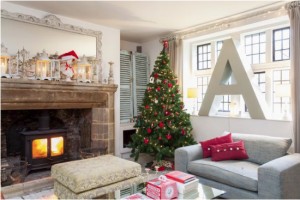
Chris Snook
REAL TREES
Reasons to buy a real tree
1. There is a nostalgic attachment to a real pine, spruce or fir tree, especially if you had one in your home as a child. Plus, they smell good!Growing up in Canada, Houzzer jmm1837 watched his dad go out with a hatchet each year, a week before Christmas, and cut down a tree. “He’d tie the tree to the roof of the car and bring it home where my mom would inspect and point out the imperfections. (It’s a real tree, mom – they’re not perfect!)
“Much as I love Australia, Christmas isn’t the same without at least a threat of snow, and a fir tree in the window.”
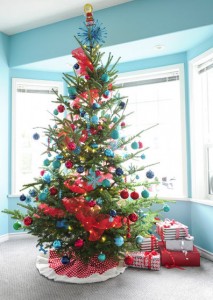
2. If you buy a real cut tree, which in Australia is most often a radiata pine (Pinus radiata), you can usually get one that has come from a local farm or business for about $60 to $80.
Going to the local Christmas tree farm to select a tree has become a family tradition in lynnrobe‘s house. “It has to be a perfect tree, just the right shape and height and we all have to agree on the same one. Once home, the decorating starts, with Christmas music, nibbles and drinks. Today, even though our children live interstate, they still look forward to coming home each Christmas and going to buy ‘The Tree’. You cannot put a price on that! When Christmas is over we mulch the tree and it feeds our strawberry plants. It will be a real tree for us for years to come.”
“I think there is something special about heading out with the kids to pick the ‘best’ Christmas tree for our family from the tree farm or local charity selling cut trees at the Scout Hall or school,” says another Australian reader, the_coopsters. “The look and smell of a real tree is divine, and as we keep it well watered, it looks good well past New Year’s (around five weeks). Plus, a real tree takes carbon out of the atmosphere and then will decompose naturally. So as awful as it seems to cut down a tree for our own Christmas indulgence, it is actually a lot kinder to our planet.”
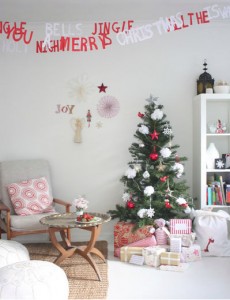
3. You can also buy a living tree in a pot – an Australian native, such as a Wollemi pine (Wollemia nobilis) is ideal. With enough care, these can be kept for the next Christmas or planted in your garden.
Another comment, from ashilleong, shows that Australian Houzzers like to go native at Christmas. “We are planting a Wollemi Pine and using that. Watching a living tree dying in our lounge room isn’t really our thing. We’ve owned various fake ones over the years, but they end up looking really ratty after a while. Growing a tree in a pot solves a lot of problems for us and it can be brought in until it gets too large/is replanted outside. Then we’ll either buy another one or move our tree decorating outside.”
Houzzer krosebax loves a small, real tree in a pot on a table. “I only go for that specific size because I don’t have much floor space in my apartment. Real is better, the smell is amazing… We always burn the wood later on in the year to make sure it’s not wasted.”
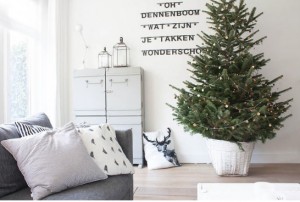
Ways a real tree can spoil the fun
1. Real trees are messy; the needles fall al over the floor when you bring the tree in, decorate it and the whole time they’re set up. They also have a tendency to look pretty shabby and wilted in hot summers.“Real is good but you need to make sure it is on a proper stand and that it gets lots of water; otherwise, you’ll have needles all over the floor inside a week,” says
jmm1837.
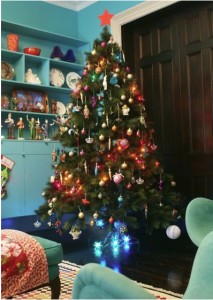
2. The Australian living room in summer is an odd spot to put an alpine tree. With the sun streaming in, the heat bearing down, and the sounds of cicadas, kookaburras and galahs around and about, a tree native to the wintery climes of the northern hemisphere not only looks out of place but quite often doesn’t last long either.
“Where you live can make a difference in choosing a tree,” says cobby1407. “A few years ago we moved to Queensland, which is very hot at Christmas time. We had a fresh tree the first year, but sadly it only lasted a week. Even with all the extra water it couldn’t take the heat and humidity – it was a lot of work decorating for so few days”.
3. Pine plantations are depleted of any biodiversity. They also displace natural vegetation and discourage native animals from living in them. Once they’re taken home, real Christmas trees can eventually become a nuisance if not disposed of by mulching or burning, a practice that isn’t permitted by local councils in the middle of summer during total fire-bans, to try to minimise the threat of bushfires.
It’s such a waste – as discussion leader Sharon Bouchard says, “Real trees often become landfill, and are left like rubbish on the streets near where I live for months after Christmas.”
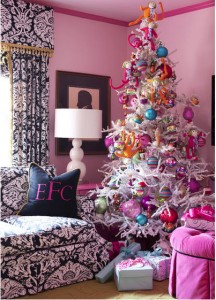
ARTIFICIAL TREES
Reasons to buy a fake fir
1. Green, white, black or pink – fake Christmas trees come in a plethora of fashion colours to suit modern decors.Sarah from
LOVEDECORATELETTERSsuggests buying quality to avoid disappointment. “We bought a good quality fake tree that has lovely foliage and I am totally happy with it. I burn Christmassy scented candles (including a fabulous fresh pine needles smelling one) and don’t think we’re missing out on anything. One year I kept the tree up until February because I was so happy with it – can’t do that with a real/dead tree!”It’s also worth hunting through online auctions and antique stores to find a fashionable tree. The one pictured here is actually not new. “This one is vintage and I haven’t been able to find another one like it anywhere!” says interior designer
Tobi Fairley.
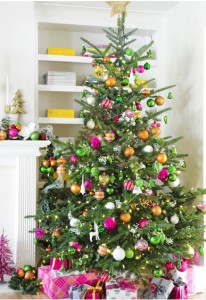
2. The design of fake trees has gotten so good that you can even choose a ‘variety’ of pine, the style of pine needle and whether you want a young-looking tree or one that appears more mature.
One reader, macgrill, had this advice for Sharon: “If you are going to buy an artificial tree, invest in a decent one, not the cheap ones from chain stores…they look fake and plastic and you will be disappointed. There are some very realistic artificial pre-lit trees out there that are more expensive but will last forever and look real. I had mine for 10 years.”
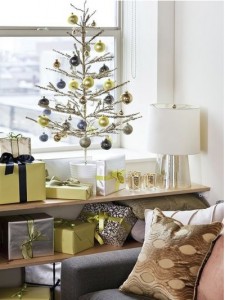
3. Artificial trees are quick to erect, easy to store for next year’s Christmas, and due to the fact that you can keep them indefinitely, they are value for money and make any initial investment worthwhile.
“A good fake tree is more expensive than a real tree, but you can use it for years,” says Linus Reimann-Kaißer.
“With the department store sales, it cost less than two years’ worth of buying a real tree!” says
LOVEDECORATELETTERS.
Yet another Houzzer saw the benefit of the move to fake: “I switched to good quality fake,” says bigreader. “I figured over the next 30+ years it would be better for the world than cutting one every year. But I mainly chose a fake one for the convenience. It looks good when decorated, and the kids don’t care what their presents sit under.”
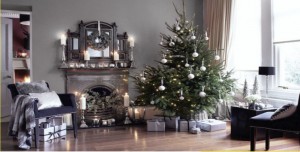
Why a fake tree can cost the earth
1. As many plastic trees are made in lands far away, they are shipped to Australia and then transported thousands of kilometres on the back of a truck to various town centres, making their cost to the environment relatively high.From an environmental standpoint,
the_coopsters isn’t a fan of fake. “An artificial tree requires raw materials to be created, shipped, processed into a tree shape, shipped again. The tree will never biodegrade, so it has a significant carbon footprint when you think about it.”
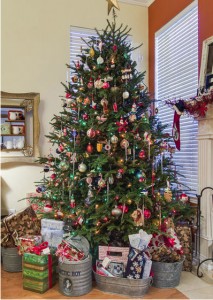
2. Artificial trees are made from plastic known as PVC. The production of PVCs requires fossil fuels and water to make, and the production process releases a significant amount of carbon dioxide, which contributes to climate change.
Although kimmasterbath posted to a similar discussion on the US site, the point is a valid one about plastics anywhere in the world: “PVC plastic trees can not be recycled and end up in a landfill. Most of them are made to last about six years. Fresh trees absorb carbon dioxide and produce oxygen. After use, 93 per cent of them are recycled becoming wood chips for use in parks and on dirt slopes to reduce erosion. Save the planet and go fresh!!!”
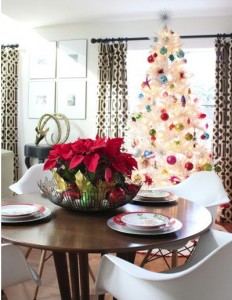
3. Faddish fake Christmas trees can be this year’s look, but as they can’t be recycled, you have to love your choice or you’ll be adding to landfill annually.
“I feel like buying plastic is not good for the world… and what if I decide I don’t like it after a few years – instant landfill?” says Sharon Bouchard.
Houzzer suzineedsahouse certainly has their mind made up. “I have never had a fake/synthetic pretend pine tree and always felt sorry for those who have.”
The last word must go to inben, who gave this simple advice: “Go fresh and natural…”











